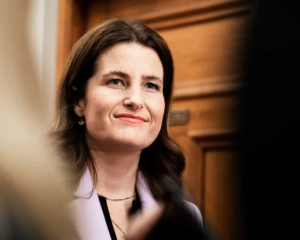
OneMusic licences certain music for use in commerical settings like pubs, club, offices, hairdressers, gym and factories, nearly anything outside of personal use.
Charges vary, playing the radio in a factory with 72 workers would cost $49 a month for licence, a gym with 500 members would pay about $104 dollars a month.
OneMusic Director, Greer Davies said music licencing had been around for a while, and the company saw a huge lack of awareness from businesses.
"It comes down to a lack of education and so our team are continually contacting businesses to educate them about the use of music and their legal requirements for music creators."
"OneMusic's been around for 13 years but music licencing existed prior to that as well, and it's an education that we need to take people on."
Davies said they were speaking to hundreds of different businesses a week, aiming to educate them about the licencing programme.
One of those business owners was a Hawkes Bay florist who said she was called by OneMusic to see if she was paying licence fees, which she wasn't.
Francie Croy said she listened to the radio on her phone out the back of her Waipukurau shop, but the music licensing organisation told her she must buy a licence or turn the music off.
"No one out front of the shop can hear it, but she said to me that I would still have a licence to have to do that because sometimes Newstalk ZB plays music."
She said after the phone call she was sent another email from OneMusic.
"It was a certificate thing, saying this is confirmation that you have advised us that you do not play music in your business and will not play music represented by this place.
"It includes television, radio stations, apps, digital music services, Spotify, Apple, YouTube, CD's, DVD's, Blu-ray, vinyl and cassette tapes, and the list goes on."
Croy said she had no idea that being charged for playing music at her business was even a possibility.
All commercial businesses, including offices and trade sites, were required to pay the licencing fee, with any music played for non-personal use.
Although the licence covered a large variety of circumstances, Davies said they had a specific focus on a group of businesses.
"Our current focus is educating business owners across hospitality, retail, service providers and exercise."
Croy said she was shocked by the request from OneMusic, which a few other businesses in the area also received.
She said it seemed unlikely that someone from OneMusic had visited her small store in Waipukurau, and thought they must be sending random emails.
Davies said the company had representatives visiting shops to vet whether they were playing music unlicensed.
"These representatives carry out a range of tasks for us, some verifying music that's being played and identified the source of that music. They also check new businesses that may have opened in vacant locations that we've been unable to reach."
She said the fees from the licence go towards artists to ensure they are paid for their music and OneMusic was partnered with APRA AMCOS and Recorded Music NZ, who pass the costs onto the artists.
"Each of those organisations distribute the revenue that OneMusic earns on their behalf, but about 85 cents every dollar is distributed."
Davies said for those that fail to pay for a licence there could be consequences, often resulting in fines.
"Generally a business owner will understand the legal obligation and obtain the relevant licence, but reluctantly, if they don't, we will pursue and potentially end up in court."
"The most recent court cases were in 2018 and 2019, and the damages were around about $15,000, $18,000."
The Ministry of Business Innovation and Employment said OneMusic licensed copyright works and MBIE did not have oversight of the scheme.
It said businesses that play music for their staff and/or customers need a licence and the licensing fees paid are distributed to producers and recording artists.
"If a business does not wish to pay any licensing fee to play music, they should not play music. To do so without a licence means the copyright owner may sue the business and award damages.
"A business who wishes to dispute the terms and conditions of the scheme may make an application to the Copyright Tribunal. If the Tribunal determines that the licensing scheme is unfair it may order changes," it said.












